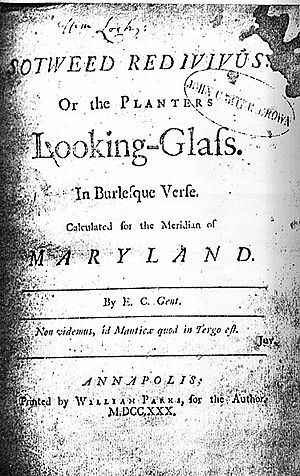Ebenezer Cooke (poet) facts for kids
Ebenezer Cooke (born around 1665 – died around 1732) was an American poet. He was likely born in London, England. Later, he became a lawyer in Maryland, which was a British colony at the time. There, he wrote several poems. One of his most famous works is "The Sot-Weed Factor: Or, a Voyage to Maryland. A Satyr" (1708). Some experts believe this poem was the very first American satire, a type of writing that uses humor to criticize something.
Contents
Who Was Ebenezer Cooke?
His Life and Journey
Not much is known about Ebenezer Cooke's early life. He spelled his name "Cook" in his published works. Like the main character in his famous poem, Cooke traveled to Maryland when he was a young man. He became a lawyer in Prince George's County, Maryland. He worked as a lawyer before going back to London by 1694.
He later returned to Maryland. This happened after he inherited part of his father's property called Malden. This property was later known as "Cooke's Point."
Most of what we know about Cooke was found by a person named Lawrence C. Wroth. Wroth published his findings in 1934. He used a few historical clues to guess more about Cooke's family. Wroth thought that Cooke's grandfather, Andrew Cooke, came to Maryland in 1661. He bought land, including "Malden."
Ebenezer's father, also named Andrew, married Anne in England in 1664. Wroth believed Ebenezer was born the next year. Based on his poem, Ebenezer might have gone to Cambridge University. He probably came to Maryland in 1694. He returned to England before "The Sot–Weed Factor" was published in 1708. He likely stayed in England until after his father's will was settled in 1711–1712. He then returned to Maryland before 1717.
Discovering His Works
Cooke's poems were mostly forgotten for a long time. But they were brought back into attention by several people.
In 1865, Brantz Mayer reprinted "The Sot-Weed Factor." He called the adventures and manners in the poem "ludicrous" (meaning very funny and silly).
Moses Coit Tyler was another admirer of Cooke's work. In his book History of American Literature (1878), Tyler praised "The Sot-Weed Factor." He said it had "genuine and powerful satire."
Later, Bernard Christian Steiner helped bring Cooke's work out of obscurity. In 1900, Steiner published a book called Early Maryland poetry. This book included Cooke's two "Sot-Weed Factor" poems. It also had "Elegy Upon Nicholas Lowe, Esq." and another early Maryland poem.
About "The Sot-Weed Factor"
"The Sot-Weed Factor" is written in a style called Hudibrastic couplets. This means it uses rhyming pairs of lines that are often humorous.
On the surface, the poem is a strong Juvenalian satire. This means it uses sharp, often harsh, humor to criticize things. In this poem, Cooke criticizes America and its early settlers. It also makes fun of the pamphlets that advertised colonization. These pamphlets often made settling in America sound easy and profitable.
The main character, or "persona," in the poem comes to Maryland as a tobacco merchant. A "sot-weed factor" was a person who bought and sold tobacco. The character is shocked by how rough and unrefined both the Native Americans and the English settlers seem. He also gets tricked by a dishonest lawyer. Because of these bad experiences, he leaves the colony feeling disgusted.
Other Writings
- "An ELOGY on the Death of Thomas Bordley Esquire", 1726
- "An Elegy on the Death of the Honorable Nicholas Lowe", published in the Maryland Gazette, 1728. (Signed "E. Cooke. Laureat")
- "Sotweed Redivivus or the Planters Looking Glass", Annapolis, 1730 (signed E. C. Gent)
- The Maryland Muse, which included a new version of The Sot–weed Factor and "The History of Colonel Nathaniel Bacon's Rebellion in Virginia", 1731 (signed E, Cooke, Gent")
- "An Elegy on the Death of the Honorable William Locke, Esquire" May, 1732 (Signed "Ebenezer Cook, Poet Laureat")
- "In Memory of the Honorable Benedict Leonard Calvert Esquire. Lieutenant Governor in the Province of Maryland" . . . U.S. Naval Academy, Annapolis, Maryland.
 | James Van Der Zee |
 | Alma Thomas |
 | Ellis Wilson |
 | Margaret Taylor-Burroughs |


